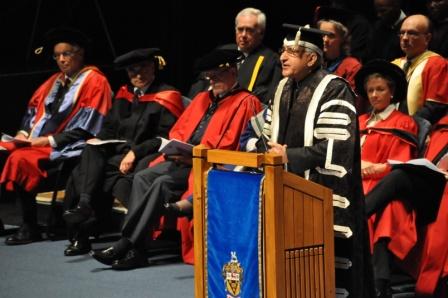
Rhodes University will affirm its position as an institution of choice for leaders with the establishment of the Allan Gray Centre for Leadership Ethics which will be launched later in the year.
The Centre will be funded by a renewable R12.5 million bequest from Allan Gray, a Rhodes University alumnus, honorary doctorate holder and founder of the Allan Gray investment company.
Addressing graduates at the first University graduation ceremony held on Thursday evening, Rhodes Vice-Chancellor Dr Saleem Badat, said that the establishment will “investigate and elaborate what constitutes ethical and responsible leadership, to promote such leadership in diverse contexts and circumstances, and to also develop education and training initiatives to foster such leadership”, he said.
He added that the University and Allan Gray have recognised the need for an institution that will provide training dedicated towards producing a generation of leaders with integrity.
“Given the pressing challenges of poverty and unemployment, hunger and disease, social equity and justice, of deepening and consolidating our democracy, our success critically depends on the extent to which we cultivate, grow and possess responsible and ethical leaders,” he said.
Such leaders are not always easy to find. “The lack of competent and accountable leadership has produced a widespread culture of unprofessional and disdainful conduct and service, and sheer indifference to the basic needs of people,” he said.
He added that society continues to witness the abuse of power by those who are given the responsibility to lead. They use their positions “for political, economic and private gain and self-enrichment, as manifested in corruption, fraud and dubious tenderpreneurial activities.”
Those who hold positions of leadership in the Public Service remain oblivious to government’s commitment to provide excellent service and to be a servant of the people.
Dr Badat said that this lack of effective “political and administrative leadership and the shortcomings in critical public services undermine the dignity of the poor, retard the educational development of millions of children and youth, thwart the realization of constitutionally and legally enshrined social goals and, ultimately, violate human and social rights.”
Dr Badat said that those in positions of leadership are often allowed to get away with their misconduct and continue with their misdemeanour in other institutions.
He reminded students of their citizenship obligation to voice their complaints against the shortcomings of those in positions of power and leadership. “Silence is not an option,” he said.
“It simply leaves the door wide open for continued irresponsible and unaccountable leadership, ongoing brazen misconduct, and a pervasive culture of impunity, greed and crass materialism in which self-interest, material wealth, profits, and performance bonuses become the new gods.”
He encouraged graduates to exercise responsible and ethical leadership in their respective career paths.
Dr Badat also reminded them that responsible and ethical leaders promote “non-racialism, non-sexism, equity, human dignity, human rights, social justice, democracy - and respect for difference and diversity: whether related to race, gender, nationality, sexual orientation, language or culture”.
By Azwihangwisi Mufamadi
